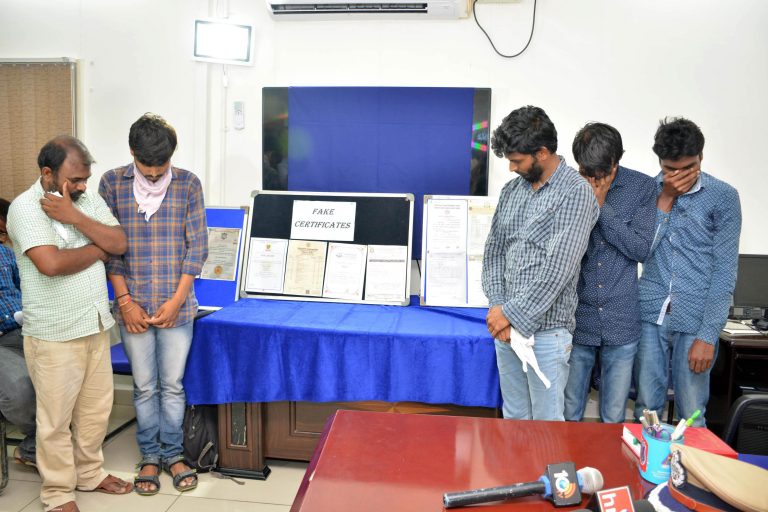
Above: The accused in a fake certificate racket busted in Hyderabad; students submitting admission forms at a school in Bikaner/Photo: UNI
Fake marksheet scams are becoming an epidemic, but with the CBI investigating the scandals it may lead to a Pandora’s Box with the probes including verification of certificates deposited by government employees
By Vipin Pubby
- “Special Task Force unearths fake marksheet scandal in UP”
- “Fake marksheet scandal busted in Saurashtra University”
- “Delhi HC asks former DUSU president to disclose who gave him false marksheet”
- “Failed 47 times but got NLUI degree”
- “Agra Police files chargesheet against Rajasthan MLA in fake marksheet case”
- “CID to probe fake marksheet case scandal”
- “Fake marksheet scandal unearthed in Vadodara”
- “Fake degree, marksheet scam busted in Meerut”
These are some of the headlines pertaining to fake marksheets and degrees that hit newspapers in the recent past. In several cases, it took years, even decades, to detect such scandals in which those who failed in examinations succeeded in landing jobs and other benefits. The malaise is spread across the country.
Recently, a fake university, offering degrees to those who never appeared in classrooms, was detected in Meghalaya. In Punjab and other states, hundreds of government employees were charge sheeted and are facing disciplinary proceedings for fake certificates.
There are two major modus operandi for those peddling fake degrees and certificates. One is to float imaginary institutions in remote towns. Often they operate from one or two rooms with a handful of staff. Advertisements are inserted in major newspapers to claim that these are recognised institutions, and degrees would be awarded after coaching through correspondence. Those taking admissions never attend classes but only get notes to study. It can be presumed that those taking admission in such institutions are well aware of their dubious nature but don’t mind getting a degree or certificate with little effort and at such a low cost.
The other way is to simply forge the documents of well-known institutions. The peddlers often do this with great efficiency and finesse so that even the authorities of these institutions find it difficult to detect the forgery.
The century-old Panjab University, which had to face the issue of its documents being forged, has started the practice of affixing holograms on its official degrees to prevent duplication and forgery. Several other institutions, too, have introduced the system. Forgers, however, keep finding new and ingenious ways to cheat the system. There are reports of sportspersons submitting false certificates of age and qualifications. Some of them were disqualified and had to face prosecution.
The CBI has already alerted all state governments that several states had “given equivalence to the examinations” conducted by the Board of Secondary Education, Madhya Bharat, Gwalior, for “the purpose of appointment in different government/private organisations and for taking admissions for higher studies”. The “board” is obviously not above board. Its website claims that it is “based in Madhya Bharat” and registered under “Government of India, Planning Commission” and is “run under the Indian Trust Act, 1882”. The information appeared to be bogus. Subsequent investigations revealed that the board was not registered and not authorised to conduct examinations or issue degrees or marksheets.
The issue came to light when the CBI’s Anti-Corruption Branch in Dehradun filed two criminal cases in December against the board, which had allegedly “issued a large number of fake marksheets and certificates with/without conducting examinations and solely for the purpose of financial gains”. The agency also found that several schools and colleges in India were affiliated to the board. A division bench of the Allahabad High Court subsequently asked the CBI director to conduct a thorough inquiry last year.
Among the states which initiated action was Haryana, notorious for its recruitment scams. Based on a CBI communication, the state government decided to verify classes X and XII marksheets and other educational certificates of all state government employees. It even asked heads of educational institutions to check the certificates submitted by college students across the state. Haryana’s chief secretary, Keshni Anand Arora, wrote to all administrative secretaries, heads of departments, divisional commissioners, registrar of the Punjab and Haryana High Court, deputy commissioners, managing directors and chief administrators of all boards and corporations, and registrars of universities to verify marksheets and certificates of employees and students.
The communication, dated November 5, stated that if anyone was found to have got employment on the basis of certificates issued by that particular board, his or her appointment should be cancelled with immediate effect and suitable action as deemed fit may be taken. The communication pointed out that “all the boards which were functional prior to Independence became invalid and ceased to exist after the establishment of the Central Board of Secondary Education in 1952. But, the names of some educational boards, including Board of Secondary Education Madhya Pradesh, Gwalior, inadvertently remained mentioned in the Uttar Pradesh Intermediate Education Act, 1921. Taking advantage of this fact, the accused persons re-established this board through Registered Trust Deeds in 2010-11 and still continue operations all over the country”.
Experts say that investigations carried out by the CBI may open a Pandora’s Box if other states too order verification of certificates deposited by government employees.

